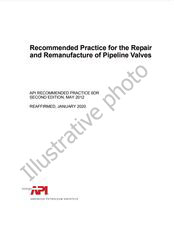We need your consent to use the individual data so that you can see information about your interests, among other things. Click "OK" to give your consent.

API STORAGETANKINSPECT-2000
COLLECTION OF 7 API PUBLICATIONS THAT INCLUDES RECOMMENDED PRACTICES AND INSPECTION STANDARDS FOR ABOVEGROUND STORAGE TANKS
Translate name
STANDARD published on 1.1.2000
The information about the standard:
Designation standards: API STORAGETANKINSPECT-2000
Publication date standards: 1.1.2000
SKU: NS-1139408
Approximate weight : 300 g (0.66 lbs)
Country: American technical standard
Category: Technical standards API
Annotation of standard text API STORAGETANKINSPECT-2000 :
API STORAGE TANK INSPECT, 2000 - COLLECTION OF 7 API PUBLICATIONS THAT INCLUDES RECOMMENDED PRACTICES AND INSPECTION STANDARDS FOR ABOVEGROUND STORAGE TANKS
API STD 653: TANK INSPECTION, REPAIR, ALTERATION, AND RECONSTRUCTION
This standard covers steel storage tanks built to API 650 and its predecessor API 12C. It provides minimum requirements for maintaining the integrity of such tanks after they have been placed in service and addresses inspection, repair, alteration, relocation, and reconstruction.
API RP 572: INSPECTION PRACTICES FOR PRESSURE VESSELS
This recommended practice (RP) covers the inspection of pressure vessels. It includes a description of the various types of pressure vessels (including pressure vessels with a design pressure below 15 psig) and the standards for their construction and maintenance. This RP also includes reasons for inspection, causes of deterioration, frequency and methods of inspection, methods of repair, and preparation of records and reports. Safe operation is emphasized within this RP.
API RP 574: INSPECTION PRACTICES FOR PIPING SYSTEM COMPONENTS
This recommended practice (RP) supplements API 570 by providing piping inspectors with information that can improve skill and increase basic knowledge and practices. This RP describes inspection practices for piping, tubing, valves (other than control valves), and fittings used in petroleum refineries and chemical plants. Common piping components, valve types, pipe joining methods, inspection planning processes, inspection intervals and techniques, and types of records are described to aid the inspector in fulfilling their role implementing API 570. This publication does not cover inspection of specialty items, including instrumentation and control valves.
API RP 575: INSPECTION PRACTICES FOR ATMOSPHERIC AND LOW-PRESSURE STORAGE TANKS
This document provides useful information and recommended practices for the maintenance and inspection of atmospheric and low-pressure storage tanks. While these maintenance and inspection guidelines may apply to other types of tanks, these practices are intended primarily for existing tanks which were constructed to one of the following four standards: API 12A, API 12C, API 620, or API 650. This document addresses the following: a) descriptions and illustrations of the various types of storage tanks; b) new tank construction standards; c) maintenance practices; d) reasons for inspection; e) causes of deterioration; f) frequency of inspection; g) methods of inspection; h) inspection of repairs; i) preparation of records and reports; j) safe and efficient operation; k) leak prevention methods. This Recommended Practice (RP) is intended to supplement API 653, which provides minimum requirements for maintaining the integrity of storage tanks after they have been placed in service.
API RP 576: INSPECTION OF PRESSURE-RELIEVING DEVICES
This recommended practice (RP) describes the inspection and repair practices for automatic pressure-relieving devices commonly used in the oil and petrochemical industries. As a guide to the inspection and repair of these devices in the users plant, it is intended to ensure their proper performance. This publication covers such automatic devices as pressure-relief valves, pilot-operated pressure-relief valves, rupture disks, and weight-loaded pressurevacuum vents.
API RP 577: WELDING PROCESSES, INSPECTION, AND METALLURGY
This recommended practice (RP) provides guidance to the API authorized inspector on welding inspection as encountered with fabrication and repair of refinery and chemical plant equipment and piping. This RP includes descriptions of common welding processes, welding procedures, welder qualifications, metallurgical effects from welding, and inspection techniques to aid the inspector in fulfilling their role implementing API 510, API 570, API 653 and API 582. The level of learning and training obtained from this document is not a replacement for the training and experience required to be a certified welding inspector under one of the established welding certification programs such as the American Welding Society (AWS) Certified Welding Inspector (CWI), or Canadian and European equivalent schemes such as CWB, CSWIP, PCN, or EFW.
API STD 1631: INTERIOR LINING AND PERIODIC INSPECTION OF UNDERGROUND STORAGE TANKS
This standard provides minimum recommendations for the interior lining of existing steel and ?berglass reinforced plastic underground tanks and periodic inspection of steel underground tanks used for the storage of petroleum-based motor fuels and middle distillates. These recommendations include procedures to be followed and operating conditions to be maintained by contractors, workers and engineers preparing, inspecting, testing and lining the interiors of existing underground storage tanks. Requirements for vapor-freeing tanks, removing sediment and cleaning interior surfaces of steel and ?berglass tanks as well as guidelines to identify tanks that are suitable for lining, are also included. All work associated with the interior lining and periodic inspection of underground storage tanks shall be accomplished in accordance with applicable federal, state, and local regulations, including applicable environmental and safety requirements.
We recommend:
Technical standards updating
Do you want to make sure you use only the valid technical standards?
We can offer you a solution which will provide you a monthly overview concerning the updating of standards which you use.
Would you like to know more? Look at this page.



 Cookies
Cookies
